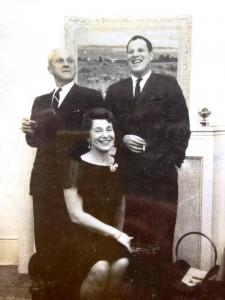 A few years back, my uncle put my grandfather’s home movies onto three DVDs and I spent yesterday evening watching them. I had seen them before, of course. Well, most of them. I had always been a little wary of number three, with the unpromising title, “Hunting and Fishing.” But I decided it was time to watch that one too, though I admit I gave up somewhere around “the fish hatchery in Compton.” And it was worth it.
A few years back, my uncle put my grandfather’s home movies onto three DVDs and I spent yesterday evening watching them. I had seen them before, of course. Well, most of them. I had always been a little wary of number three, with the unpromising title, “Hunting and Fishing.” But I decided it was time to watch that one too, though I admit I gave up somewhere around “the fish hatchery in Compton.” And it was worth it.
It begins with scenes of hunting in what was Czechoslovakia, in the years right before the war. My grandmother and grandfather are both there, dressed like they are about to climb every mountain, as they indeed did a couple of years later. They hunted in the way modelled for them by the nobility of Austria, with the rows of rabbits and birds and beasts lined up, a final report for the master of the hunt, and a moment of respect for the animals who gave their lives that day. They were probably at the hunting lodge of my father’s cousin and brother-in-law, Paul, and I can’t say for certain of course, but I imagine most of the people in the film, apart from the beaters perhaps, were Jews like them. In 1848,the same time that the Jews began to be liberated from the laws that constrained their lives, the right to hunt was opened beyond the nobility in the Austro-Hungarian Empire, and my ancestors took advantage of all their new freedoms. The night before the hunt, they drink and laugh, most of them in their twenties, and my uncle’s voice-over names those he recognizes: Ruda Beck, my grandfather’s best friend, who survived Auschwitz; the Winters, Ernst and Ilona, who got out in time.
After the War, my grandfather returned to Czechoslovakia, to find what was left, first in 1946 and again, with my grandmother, in 1947. A film clip shows her on a train with final destination marked “Praha,” after a little skiing at Davos, or was it Zermatt? My grandfather hunted again with Paul, who had survived Theresienstadt. The film, now in colour, shows a much diminished group, Paul’s face, gray and worn but he smiles when he receives a bottle of Slivovitz in a newspaper wrapping from one of his guests. The prizes of all these hunts, the antlers of the deer and the fanned tail feathers of the capercaillie, still hang on the walls of the house my grandfather built in the 1960s.
It is wonderful to see, in these movies, the faces of the people I loved. My father, endlessly, as a baby, looking worried, my grandmother laughing and flirting for the camera. my grandfather, handsome and debonair as he carves through the snow on skis (a relatively new pastime in the 30s). My grandfather thought he was Cecil B.DeMille, so there are rather more shots of pre-war (unbombed!) Rotterdam, moody churches in Budapest, and dark Viennese palaces (with one tentatively goose-stepping guard) than I would like, when all I really want to see is my family, the ones I knew and the ones I didn’t.
My uncle was far better behind a camera than my grandfather, though his medium was the still rather than the video. Did my uncle take the photograph at the top of this post? I love this picture, because it shows my grandmother, grandfather, and father the way I remember them. My grandmother is glamorous and vivacious, smiling and having fun. I admire the way she seized the joy out of life, right to the very end. My father is laughing in this image that shows him almost at the exact midpoint of his life — and holding one of the damned cigarettes that eventually killed him, far too young. I see both myself and my son in his face. My grandfather looks serious, but apparently he is doing his “Jack Benny face.” Whether my uncle took this one or not, his attention to the faces of our family, to the way we look from the outside made him the eye through which we look back at ourselves, as a family. Most of my favorite photos of my family were taken by him, and it is not surprising that he was the one to preserve these videos for us. He talks, at the beginning of the video, of how bittersweet it is for him to do this work, to create this bridge between past and present. I am grateful.
